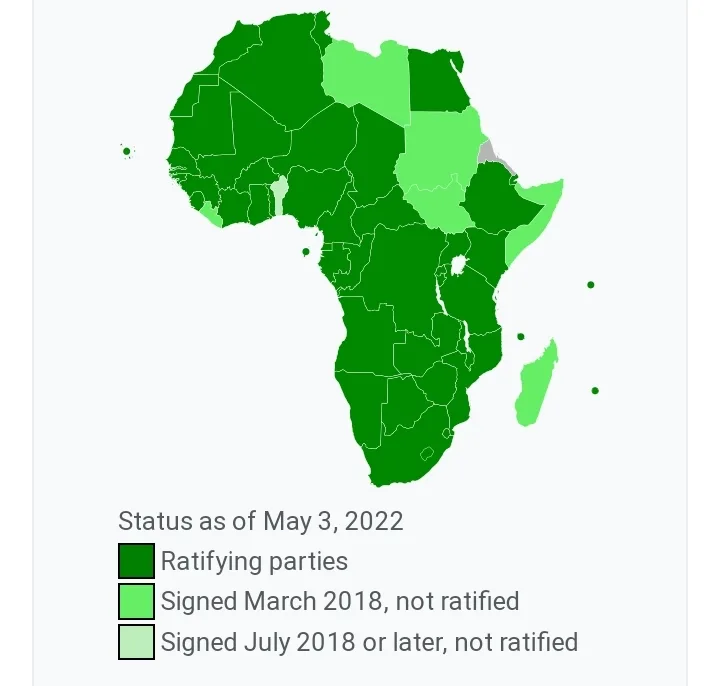The African Continental Free Trade Area brings the promise of a new vista for African film industries, including more robust intellectual property rights, distribution avenues, and funding opportunities.
By Joseph Jonathan
In March 2018, there was a historic agreement between 52 African countries, establishing the African Continental Free Trade Area (AfCFTA). However, it was not until January 2021 that the largest free trade area in the world in terms of participating countries – since the establishment of the World Trade Organisation – became fully operational. By effect, the AfCFTA brought together some 1.3 billion Africans into the same market, for a combined GDP of more than US$3 trillion.
The major objective of the AfCFTA is to encourage the free movement of “made in Africa” goods, foster intra-African trade and promote intra-African trade relations. This is of great importance, especially in light of a 2019 report by the United Nations Conference on Trade and Development (UNCTAD) which revealed that between 2015 and 2017, intra-African trade stood at 15%, compared to intra-continental trade figures of 47% for the Americas, 61% for Asia and 67% for Europe. In fact, most African countries trade more with some European countries than with their direct neighbours.

The AfCFTA seeks to enhance economic integration and boost the competitiveness of African industries. Specifically, within the creative industry, the AfCFTA aims to facilitate the free movement of goods and services by reducing trade barriers and harmonising regulations. This initiative is designed to unlock the vast potential of Africa’s creative economy, spanning sectors like film, music, literature, fashion, and visual arts. By fostering collaboration and innovation, the AfCFTA aims to amplify the global impact of African creativity while promoting sustainable growth in the creative industries across the continent.
The AfCFTA agreement was implemented in stages and the first stage focused on the removal of tariffs on 90% of goods and other trade barriers between African countries within the next 10 years. However, the effect of this policy on the film industry is minimal as video products are already fully digitalised and film equipment will continue to be imported from outside the continent. For this policy to benefit the industry, there is a need for African countries to revamp their visa regulations to ease the movement of filmmakers and other crew members. For instance, Kenyan President, William Ruto announced a visa-free policy for all Africans coming into the country. This, he said, was to boost trade and allow goods, services, people and ideas to move freely across the continent.
It is in the second stage of implementation that the AfCFTA holds more promise for the film industry as it tackles piracy which remains a huge problem facing filmmakers in Africa. This second stage focuses on intellectual property rights, including the ability of rights holders to register ownership of intellectual property through a single process that would cover the entire continent. Through this process, there would be a single, unified jurisdiction for the administration and distribution of intellectual property rights in Africa. The enforcement of proactive copyright laws raises the value of intellectual property generated in Africa and encourages creativity and innovation across the continent. In addition, doubling down on piracy ensures that filmmakers maximise profits from their films.
At the 2023 Intra-African Trade Fair (IATF2023) organised by the African Export-Import Bank (Afreximbank), in collaboration with the African Union Commission (AUC) and the AfCFTA Secretariat, it was announced, too, that a $1 billion African Film Fund will be launched in 2024 to support the continent’s film industry. This fund would oversee film financing and co-finance with large studios, funding African filmmakers for film projects across the continent. For an industry which currently employs an estimated 5 million people and accounts for $5 billion in GDP, the African Film Fund will mean that African filmmakers can access funding from a broader pool of investors. This translates to more ambitious projects, which contribute to the overall quality of African Cinema films.

Despite the prospects of the AfCFTA for Africa’s film industry, there are still some areas needing improvement. For instance, film permits in Africa vary from country to country. In Zambia, film permits cost $50 per crew member, Rwanda ($30 for 15 days and $50 for 30 days), Uganda (between $100 – $300), Tanzania ( $1000), Cameroon ($500), and Nigeria ($350). These varying costs do little to encourage intra-African collaborations, especially among indie filmmakers who might not have the required budget. While the economic realities of African countries vary, it would be beneficial to set up a fair benchmark price for film permits which can be used across Africa.
In addition, the regulatory framework in African countries differs, and as such, there could be issues with implementing the lofty policies of the AfCFTA that would benefit Africa’s film industry. Consequently, harmonising policies and establishing a framework for standardised collaboration will be crucial to ensuring a seamless integration of various African film industries.
The African Continental Free Trade Area brings the promise of a new vista for African film industries, including more robust intellectual property rights, distribution avenues, and funding opportunities. By harnessing these potentials, the film sector in Africa stands to become a powerful vehicle for cultural exchange, fostering unity and shared narratives that resonate across the continent and beyond. However, there is a need for African countries to rethink the importance of the creative sector in projecting the region’s soft power and boosting the economy.
Joseph Jonathan is a historian who seeks to understand how film shapes our cultural identity as a people. He believes that history is more about the future than the past. When he’s not writing about film, you can catch him listening to music or discussing politics. He tweets @JosieJp3




